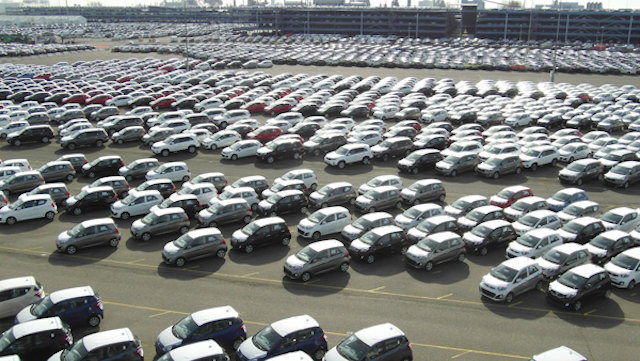
Motor Industry Association (MIA) figures show that 161,510 new passenger cars and commercials were registered in New Zealand in 2018, but an estimated 32,000 of those were registered before being offered for sale – and there is nothing on record to show that they actually ended up being sold to an end-user.
According to confidential records, the 32,000 were registered with the NZ Transport Agency (NZTA) as demonstrators by distributors and/or their dealers. The NZTA logs only registrations, not actual sales.
For all the public and industry observers know, many, if not most, are still unsold demonstrators a year after they were filed. There are thousands parked in storage centres in Auckland alone.
Where does the 32,000 figure come from? It represents around 20 per cent of 2018 registrations, a number roughly consistent with monthly pre-registrations (aka first registrations) in recent boom years.
For example, at the end of May, confidential figures show, 10,609, or 24.5 per cent of the 43,191 new vehicles registered with the NZTA after five months of trading were distributor and/or dealer demonstrators.
Again, there is nothing in government agency records to show that those vehicles registered early last year have found owners other than the original distributors and/or dealers.
Later in the year, at the end of November, 29,546, or 20 per cent, of the 150,393 new vehicles registered with the NZTA were demonstrators.
Who among the mainstream names pre-registers most vehicles? Luxury marque BMW headed the list at the end of last November. It had registered 1610 new vehicles with the NZTA, 891, or 55.3 per cent, of which were demonstrators.
Lexus pre-registered 362 new vehicles, or 48.7 per cent, of the 742 logged with the NZTA after 11 months of 2018; Volvo recorded 48 per cent, or 293 of 608; Jaguar 48 per cent, or 181 of 375; Jeep 43.5 per cent, or 627 of 1441.
They were followed by Audi (39.4% 692-1752), Land Rover (37.8% 381-1009), Skoda (36.0% 544-1505), Volkswagen (31.8% 1722-5407), Mercedes-Benz (28.7% 953-3325), Hyundai (26.8% 2022-7537).
Those occupying the middle ground of 25.0% or less included Ford (24% 3727-15468), Isuzu (24.6% 642-2605), Holden (23.5% 2833-12,036), Subaru (20.8% 720-3453), Mitsubishi (20.5% 2344-11,411), Ssangyong (19.7% 198-1006), Mazda (14% 2005-14,411), Suzuki (17.0% 1053-6183), Kia (16.8% 1103-6559), Nissan (16.3% 1248-7651).
Distributors who pre-registered the fewest new vehicles at November last year were: van and ute company LDV (8.0%), Honda (8.0%), Toyota (9.4%), Fiat (9.7%).
How the top 15 distributors fared at the end of December last year – 2018 numbers first – compared with 2017:
Toyota: 32,260 – 32,282 – 0.0%
Ford: 16,366 – 16,827 – 2.7%
Holden: 13,046 – 14,411 – 9.5%
Mazda: 12,238 – 12,135 + 0.8%
Mitsubishi: 12,320 – 11,456 + 7.5%
Nissan: 8311 – 7842 + 6.0%
Hyundai: 8098 – 7892 + 2.6%
Kia: 6885 – 6485 + 6.1%
Suzuki: 6519 – 6983 – 6.6%
Volkswagen: 5909 – 5576 + 6.0%
Honda: 5294 – 4616 + 14.6%
Mercedes-Benz: 3679 – 3680 – 0.0%
Subaru: 3632 – 3340 + 8.7%
Isuzu: 2548 – 2774 – 8.0%
LDV: 1989 – 1268 + 56.8% (LDV’s year-on-year growth was boosted by its T60 ute).
The passenger vehicle most popular with private buyers in New Zealand last year was the Mazda CX-5, registration data shows.
The NZTA registered 3695 CX-5 variants in 2018, 459 more than the 3236 it logged in 2017, when the CX-5 was second among private buyers to another SUV, the Kia Sportage, with 3555 registrations.
The top two places were reversed in 2018 – Sportage was runner-up with 3289 units. Third in the private passenger vehicle segment with more than 2000 units was the Suzuki Swift (3034) followed by the Toyota Corolla (2635), Mitsubishi Outlander (2405), Nissan Qashqai (2160), Toyota RAV4 (2057), and Holden Captiva (2012). The hatchback Swift was the No. 1 passenger car.
The Corolla recorded the highest number of registrations (7300) in 2018 but 4665, or 64 per cent, of those were logged to fleet and car hire agencies. Same with 2907, or 59 per cent, of the 4964 Toyota RAV4 registrations.
The Ford Ranger topped 2018 ute numbers with 9904 registrations, up 484 units on 2017. The Toyota Hilux came in second with 8086 registrations, also up 980 units on 2017. Ford registered 463 Ranger rentals; Toyota 434 Hilux rentals.
MIA chief executive David Crawford reckons the 2019 new vehicle market won’t be as buoyant. He said: “Given current global economic factors, distributor expectations for 2019 indicate a softening. Further steady growth above 2018 is not expected.”
Luxury passenger vehicle (car and SUV) numbers in 2018 point to a softening. Mercedes-Benz last year was down -11.3 per cent on 2017 (2251-2540); Audi slipped -12.0% (1811-2060); BMW -15.6% (1649-1954).
